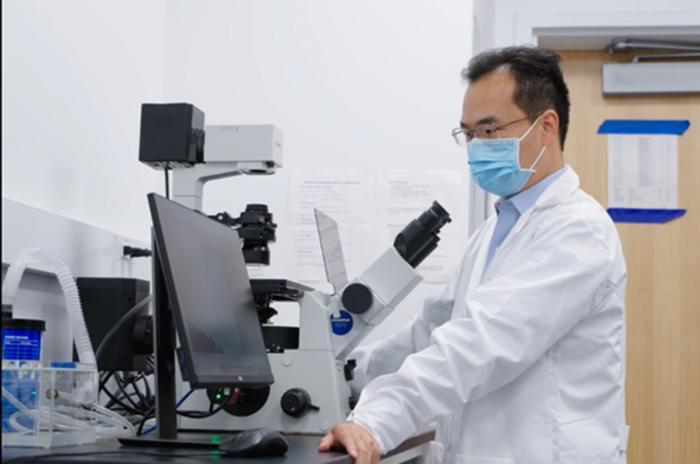LEXINGTON, Ky. (Nov. 15, 2023) — One University of Kentucky researcher is working to develop new techniques for radiation treatment to improve survival rates of patients with a specific type of cancer.

Credit: University of Kentucky
LEXINGTON, Ky. (Nov. 15, 2023) — One University of Kentucky researcher is working to develop new techniques for radiation treatment to improve survival rates of patients with a specific type of cancer.
Caigang Zhu, Ph.D., is an assistant professor in the Department of Biomedical Engineering in the UK Stanley and Karen Pigman College of Engineering. He is also a member of the Molecular and Cellular Oncology Research Program at the UK Markey Cancer Center.
The National Institute of Dental and Craniofacial Research of the National Institutes of Health (NIH) awarded Zhu a prestigious R01 grant of $2 million over five years to develop optical metabolic spectroscopy and imaging tools.
Zhu is targeting head and neck squamous cell cancer. Squamous cells line the body’s skin, mucous membranes and other tissues, including the mouth, throat and voice box. These types of cancers make up 4% of cases in the U.S., according to the National Cancer Institute.
“Cellular metabolism is highly dynamic and strongly influenced by its local vascular microenvironment, gaining a systems-level view of tumor metabolism and vasculature in vivo is essential in understanding many critical cancer biology questions,” said Zhu
Currently, there are few techniques to help oncologists answer those questions. Zhu’s Spectroscopic Imaging Laboratory, in the Pigman College of Engineering and supported by Markey, hopes to make a difference.
Researchers in the lab will develop a new device to quickly measure tumor properties using a special fiber and smart techniques to map the blood vessels connected to them.
“The team will then use this technology to address the critical challenge of head and neck squamous cell cancer that is resistant to radiation,” said Zhu. “Our goal is to make the new technologies easy to access, easy to use and systematic, which are all critical to maximizing its accessibility for cancer research.”
Treatment for head and neck cancer may involve surgery, radiation therapy, chemotherapy, targeted therapy, immunotherapy or a combination of these approaches.
Zhu and his team will integrate the new techniques with state-of-the-art stable isotope-resolved metabolomics — an approach that can reveal how different substances are processed and transformed in the body.
Through this research, Zhu aims to better understand why some cancers are resistant to radiation and identify therapeutic targets related to tumor metabolism. He hopes the findings will also be applicable in studying other types of cancers.
Research reported in this publication was supported by the National Institute of Dental and Craniofacial Research of the National Institutes of Health under Award Number R01DE031998, and by the National Institute of General Medical Sciences of the National Institutes of Health under Award Number P20GM121327. The content is solely the responsibility of the authors and does not necessarily represent the official views of the National Institutes of Health.
UK HealthCare is the hospitals and clinics of the University of Kentucky. But it is so much more. It is more than 10,000 dedicated health care professionals committed to providing advanced subspecialty care for the most critically injured and ill patients from the Commonwealth and beyond. It also is the home of the state’s only National Cancer Institute (NCI)-designated cancer center, a Level IV Neonatal Intensive Care Unit that cares for the tiniest and sickest newborns, the region’s only Level 1 trauma center and Kentucky’s top hospital ranked by U.S. News & World Report.
As an academic research institution, we are continuously pursuing the next generation of cures, treatments, protocols and policies. Our discoveries have the potential to change what’s medically possible within our lifetimes. Our educators and thought leaders are transforming the health care landscape as our six health professions colleges teach the next generation of doctors, nurses, pharmacists and other health care professionals, spreading the highest standards of care. UK HealthCare is the power of advanced medicine committed to creating a healthier Kentucky, now and for generations to come.




